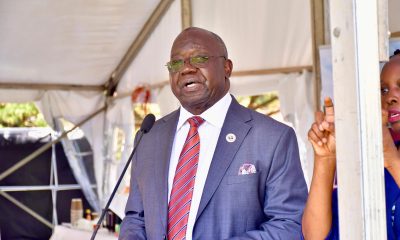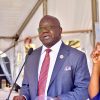News
Uganda’s elusive struggle to build a national cultural identity

karamoja dancers
This is the million dollar question that was at the centre of National Theatre’s inaugural debate on Culture scheduled to be held every last Wednesday of the month.
Brought together by a stroke of a pen by colonialists, Ugandans have not succeeded yet in abandoning ties to their ethnic roots and cultural norms and customs, nearly a century down the road.
In an effort to entrench unity among Ugandans, there have been deliberate efforts since independence to try to cultivate and nurture into one people by emphasizing aspects such as language – Swahili that can bind us together as one people as opposed to identifying and thinking of ourselves as belonging to one of the 62 tribes or nationalities.
Institutions like the Uganda National Cultural Centre (UNCC) were for instance established to Preserve, Promote and Popularise Uganda’s culture. Apart from administrative problems that have dogged the institution in recent months, these national cultural institutions struggle in an apparent futile search for a national cultural identity to guide their work.
In a move aimed at creating better understanding and definition of Uganda’s culture, the management of UNCC held their inaugural debate on culture by inviting prominent thinkers as well as the general public to a debate on whether or not Uganda has or should strive to create a common culture.
The adoption of the Kanzu and Gomesi as cultural dresses by a growing number of ethnic groups in Uganda, as well as common behavioural attributes such as the much acclaimed hospitality and gentility, are some of the tendencies shared by a vast majority of Ugandans no matter their ethnic background.
Still, there are more things that divide us than unite us. When asked who they are, most Ugandans in Uganda would prefer to identify themselves as belonging to given ethnic group than identifying themselves Ugandan. The fact that a Muganda, Mugishu or Mukiga still cannot successfully stand for major political position in Acholi or Lango and vice versa, is another damning indicator that Ugandans still lack a national identity.
Cultural tensions, stereotypes persist
Until now, people of different ethnic backgrounds do not shy away from airing sectarian remarks. Media reports this week that indicated that leaders of Ankole Cultural Trust had petitioned the Police against a planned visit to Mbarara by Buganda’s Katikkiro Charles Peter Mayiga, who was on fund-raising drive to restore Kasubi tombs, a national heritage site, illustrate the underlying ethnic tensions.
The decision by President Museveni a few years ago, to support the idea of ring-fencing certain political leadership posts as a preserve for the Banyoro in a multi-ethnic community, still illustrate the reigning tensions among the people.
In regular conversations, people still hold strong negative stereotypes against people of a different ethnic background, a sign that they despise that particular group or that they feel uncomfortable having them as neighbours.
Emily Drani, the Executive Director of the Cross-Cultural Foundation Uganda argues that politics has played a central role in undermining the process of national cultural development. But other observers noted that the division are just a mirror of what Uganda really is.
She noted that the presence of different ethnically-aligned caucuses in Parliament such as the Buganda Parliamentary Caucus, Teso Parliamentary Caucus, which strive to represent the interests particular groups, signify the lack of shared destiny.
“If we are all appreciative of a national cultural identity, we shouldn’t worry that we’re represented by only a few people who have the interests of the nation,” said.
Drani explained that besides our diverse ethnic backgrounds, Uganda has failed to develop a common beliefs system because politicians have used culture as a wedge to divide and dominate for selfish interests.
Drani argues that national identity is built on the appreciation by people of what the state is able to give to them, so that they feel obliged to give back.
“If you know that when you go to Mbale hospital, you can get good services just like any other Ugandan, then you’ll appreciate Uganda and want to identify with it. This is the starting point for anyone who wants to construct national identity, which is the starting point for building a national culture for a country as diverse as Uganda,” Drani adds.
“You can see from the past political regimes, whichever ethnic group has been in power, it has tried to give advantage to people from the leader’s ethnic background. In that sense, cultural identity is seen as exclusive. If you want to talk about cultural or national identity, those are things that we have to get over,” she argued.
Drani however noted that its not impossible to nurture a sense of cultural identity. She pointed at public policies that ensure that Ugandans are required to work in locations other than those where they are born.
She also cited the use of education as an avenue that can deliberately be used to build a sense of national cultural identity and unity by teaching different cultures to different people.
“You can be part of Nkoba za Mbogo even if you are an Acholi so that you can learn about other cultures and be able to benefit from the richness of other cultures,” she argued.
But veteran journalist, Onapito Ekomoloit, who currently works as the Head of Corporate Affairs for Uganda Breweries, strongly opposes the idea that Uganda should strive to build a national culture.
Onapito argued that any attempt to try to create a national culture will be costly as it could lead to loss of diversity and the accompanying wealth of knowledge emanating from these cultures.
Onapito argues that whereas it may be necessary to have a national identity, for administrative purposes, it is detrimental to try to aspire to create a national cultural identity.
“Uganda is a land of many cultures and any effort to create one culture, is bound to be futile.
To me ethnicity has been demonized but it is the most natural thing. What society needs to do is to harness the positive attributes of each ethnic group and make sure that we co-exist in our diverse ways,” Onapito adds:
“In many cases, its our fault as elites to try to pretend that we are one people. At the end of the day, we are different. I have seen it in practice, when people retreat into marriage ceremonies, they practice their unique cultures.”
Onapito notes that efforts to create a national cultural orientation has resulted into the death of language, considered a store of knowledge.
“I strongly believe that if you find in this city kids who come from families which don’t speak the language of their parents, they tend to have a certain disorientation which verges more like a Black American disorientation. Up to date, Black Americans have never recovered from this disorientation and dislocation,” he adds.
He concludes: “Any effort therefore to try to tell you that you’re a Ugandan and not a Munyankole or an Acholi which is a natural linguistic group, means that you’re lost.”
Onapito’s view is supported by several other cultural scholars like Charles Mulekwa, a play-write and Mercy Mirembe Ntangare, an anthropologist at Makerere University.
In the final analysis, it emerged that a common language is the most important element in building cultural identity. The people of Tanzania for example, see themselves as Tanzanians first before they can identify themselves as either Chaga or Masai.
This is largely because they speak Swahili that has bound them together for generations. The same thing goes for Americans who have largely abandoned their diverse ethnic identities in favour of English ways of life.
However, while Uganda may not have a homogeneous unique culture in the near future, there are fears that Ugandans may adopt the growing global culture dominated by American ways of life.
This is demonstrated by strong influences such as the rapid adoption of English as a language and western habits, music, dances, fashions, food and even choice of sex partners as evidenced by the spread of homosexuality in recent years.
While the disappearance of Luganda, Ateso and the accompanying intellectual wealth may not alarm many young Ugandans today, the reality that they could soon fail to have a child because they are in a same sex relationship, still brings goose pimples to many.
It’s perhaps from this point that those involved in the job of preserving culture could realise and tirelessly protect the positive attributes of the diverse indigenous cultures that Uganda is blessed with.
Comments


















